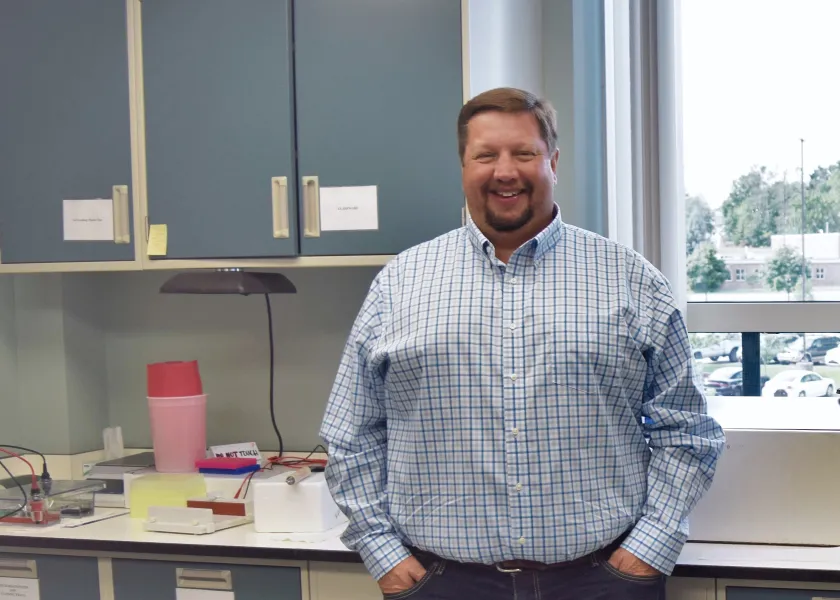“It was a pretty nontraditional pathway that led me to Northern Michigan University,” said Matthew Jennings, assistant professor in the School of Clinical Sciences. One week before graduating with a bachelor's degree in biology, he made a spontaneous decision to start his career overseas based on an unexpected series of events.
“While visiting home in Hawley, PA., during my senior year at Bloomsburg University, I went to listen to Dr. Clyde Goulden give a talk about his work and research in Mongolia,” said Jennings. “Knowing him through a mutual friend, I went up to him and asked if he needed help. To my surprise, he said yes and asked what my degree was in. Ten days later, I was on a flight to Mongolia. It was a really bizarre circumstance.”
Jennings regards that 1997 international research trip as the single most impactful experience of his career. He participated in the Mongolian Aquatic Ecology Expedition through the Academy of Natural Sciences in Philadelphia. Jennings spent two months tent camping in northwest Mongolia alongside Lake Hvosgol, which feeds Lake Baikal, the largest freshwater lake by volume in the world.
The group studied fish feeding habits, water quality and unique insect species in that ecosystem, including a type of caddisfly that was previously undiscovered. Like a domino effect, the trip paved the way for the rest of Jennings' career.
“My Mongolia experience set me apart. It really opened up a lot of doors for me when I returned to the United States because people were interested in interviewing someone who had that type of experience. As it relates to NMU, they were interested in that when interviewing me. So in a way, it helped me get to where I am.”
Jennings joined the NMU faculty in fall 2016. He serves as the program director for the clinical molecular diagnostics master's degree program, for which he teaches in a primarily online capacity. He also teaches some undergraduate-level courses. Jennings has also served as the chair of the Graduate Program Committee, which is responsible for all matters related to graduate programs at NMU.
As manager of the CLS molecular laboratory and laboratory director for the Upper Michigan Brain Tumor Center (UMBTC), Jennings stays involved in numerous research projects. One focuses on assay development for detection of viral and bacterial pathogens. He and colleagues have developed a pair of assays for intraoperative detection of a specific mutation in glioma brain tumors. Most recently, Jennings and colleagues have submitted a manuscript for a molecular, diagnostic test for the detection of an oncometabolite.
Working in a field related to pathogen detection, Jennings said that during the coronavirus pandemic he was working on the development of assays for the detection of the virus. Jennings and Paul Mann, associate dean and director of the School of Clinical Sciences, earned a provisional patent for a novel detection system for identifying the pathogens Staphylococcus aureus and Human Immunodeficiency Virus (HIV). Although the system is independent of the COVID-19 virus, Jennings said it is possible that it could be used for COVID-19 detection.
Jennings noted that the most rewarding aspect of his work is when student learning connections are made.
“I love when the lightbulb goes off in a student's head, particularly in the laboratory setting. When students come into the laboratory, it gives meaning to lecture content.”
Jennings was appointed by NMU one year after earning his doctoral degree in biochemistry, microbiology and molecular biology from Pennsylvania State University. His academic and professional experiences prior to that were diverse.
After completing a temporary position producing the influenza vaccine in Pennsylvania upon returning to the U.S. from Mongolia, Jennings assumed a laboratory technician role at the Coriell Institute for Medical Research in New Jersey. A connection made there led him to later become the clinical laboratory supervisor at Advanced BioMedical Laboratories, a clinical diagnostics company that performed HIV drug-resistance testing.
“That really sent me down the molecular pathway of my career, as well as a clinical pathway which qualified me for teaching in clinical sciences, and particularly for my current molecular sciences teaching position.”
Prior to pursuing his doctoral degree, Jennings worked for 12 years in an array of biotechnology and pharmaceutical settings, such as investigative laboratory work related to diabetes and biotechnology work in Baltimore, Md., related to stem cell research at Osiris Therapeutics. While working in his clinical laboratory supervisor position, he accepted an adjunct teaching position at Camden County College in New Jersey, where he taught after pursuing his master's degree in forensic DNA and serology from the University of Florida.
Jennings' wife, Sarah, also works at NMU as an instructor of nursing and recently completed a doctorate in nursing practice in transformational leadership and systems management. The dynamic duo resides in Marquette with their two children, Ethan and Ava.
Outside of the lab, one of Jennings' favorite places to spend time is on a golf course. You may also spot him in town supporting his children at one of their many extracurricular activities, whether it be a sporting event, dance, theater or choir performance.
Although Jennings describes himself as an “open book,” some may be surprised to learn that his top bucket list item is to travel to all seven continents. With only two more to go, he aspires to check that goal off his list by someday visiting Africa and Antarctica.
“I love to travel. I've been very fortunate travel-wise. In high school, I went to Australia and New Zealand on a golf trip. My family and I love to travel together, too. We recently went to Iceland. We went to the Galapagos Islands about seven years ago, too, which was pretty incredible.”
An adventurous spirit, Jennings has certainly embraced lifelong learning to its fullest through

